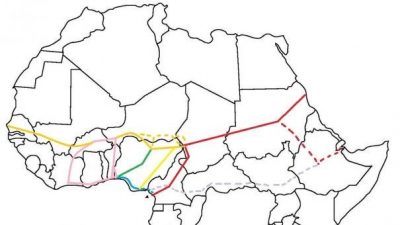Trans-African Railways: Russia’s Expertise Could Reshape African Geopolitics

Sudan’s proposal to have Russian companies help construct the East-West and North-South Trans-African Railways could reshape African geopolitics if Moscow succeeds in leveraging its possibly newfound strategic position in this sphere to “balance” between the two emerging blocs in the modern-day “Scramble for Africa”.
Sudan just proposed during an intergovernmental commission with Russia to have Moscow help construct the East-West and North-South Trans-African Railways that will partially run through its territory, seeing as how the two states are very close strategic partners and Sudan is also the mainland-maritime nexus connecting both of these ambitious megaprojects. The author previously mapped out the first-mentioned of these trans-continental initiatives in a piece that he wrote back in February 2017 about what he described as the “Sahelian-Saharan Silk Road”, which is envisaged as bringing together a variety of East-West connectivity corridors stretching from the Senegalese capital of Dakar on the Atlantic Ocean all the way to the Red Sea coastal city of Port Sudan and is described more in detail in the aforementioned hyperlinked analysis:

Map Key
Red: CCS (Cameroon-Chad-Sudan) Silk Road
Gold: Trans-African Highway 5
Lavender: Ethiopia-Nigeria Silk Road (the most direct projected route through resource-rich territory)
Pink: West African Rail Loop
Blue: Lagos-Calabar Silk Road
Green: Lagos-Kano Silk Road
Yellow: Port Harcourt-Maiduguri Silk Road
As for the proposed North-South Trans-African Railway, it can be reasonably speculated that it would run from Sudan to Ethiopia and then down through the East African Community (Kenya & Tanzania specifically) to Mozambique and/or Zambia-Zimbabwe and ultimately the South African city of Cape Town, the latter of which is specifically mentioned as the terminal point of this megaproject in the Russia-Sudan intergovernmental commission’s minutes. There currently aren’t any North-South connectivity initiatives seriously being pursued at the moment, which is why it’s difficult to tell exactly where it would traverse, but the important takeaway is that Khartoum sees Port Sudan as being the northern terminal point and that this vector of the Trans-African Railway will cut through the several countries between them in one way or another.
Russia’s possible involvement in constructing the trans-Sudanese parts of these projects would cement its influence in the mainland-maritime nexus connecting these two megaprojects, which could in turn be leveraged to advance Moscow’s envisioned 21st-century grand strategy of becoming the supreme “balancing” force in Afro-Eurasia. For that to happen, however, Russia would need to deftly manage the two emerging “blocs” of countries that are participating in the modern-day “Scramble for Africa” through a combination of its diplomatic finesse, “mercenary” security services, state-building activities (the concept of which is currently being tested in the Central African Republic), and its crucial expertise in constructing railway corridors across challenging terrain, which would altogether allow it to play a mutually beneficial role for all continental and extra-regional players in this competition.
From its strategic base in Sudan, Russia would be able to indirectly exert influence along the East-West and North-South Trans-African Railways. The first one would cut through “Israel’s” new military ally in Chad and France’s military “sphere of influence” stretching from that country to Senegal across the so-called G5 Sahel states, while the second would extend through the GCC’s new “sphere of influence” in the Horn of Africa via Ethiopia and then southwards across the East African Community (EAC) and Southern African Development Community (SADC) “battlegrounds” of the Chinese-Indian New Cold War. As such, Sudan is shaping up to be indispensable not only to China, but also to 21st-century African geopolitics as a whole following the fast-moving paradigm shifts of the emerging Multipolar World Order that’s Russia’s actively facilitating there.
*
Note to readers: please click the share buttons above. Forward this article to your email lists. Crosspost on your blog site, internet forums. etc.
This article was originally published on Eurasia Future.
Andrew Korybko is an American Moscow-based political analyst specializing in the relationship between the US strategy in Afro-Eurasia, China’s One Belt One Road global vision of New Silk Road connectivity, and Hybrid Warfare. He is a frequent contributor to Global Research.

